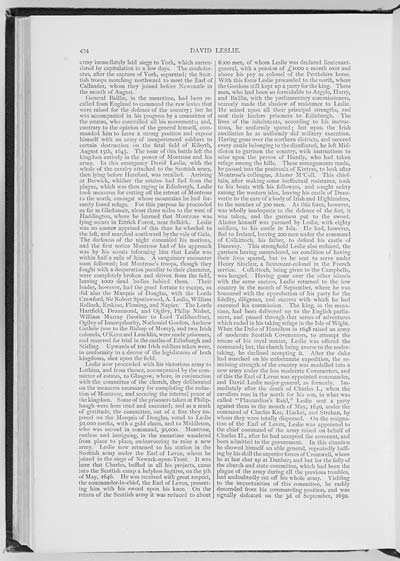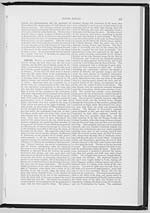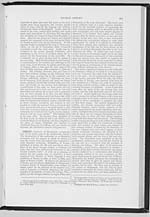494
army immediately laid siege to York, which surren-
dered by capitulation in a few days. The confeder-
ates, after the capture of York, separated; the Scot-
tish troops marching northward to meet the Earl of
Callander, whom they joined before Newcastle in
the month of August.
General Baillie, in the meantime, had been re-
called from England to command the raw levies that
were raised for the defence of the country; but he
was accompanied in his progress by a committee of
the estates, who controlled all his movements; and,
contrary to the opinion of the general himself, com-
manded him to leave a strong position and expose
himself with an army of inexperienced soldiers to
certain destruction on the fatal field of Kilsyth,
August 15th, 1645. The issue of this, battle left the
kingdom entirely in the power of Montrose and his
army. In this emergency David Leslie, with the
whole of the cavalry attached to the Scottish army,
then lying before Hereford, was recalled. Arriving
at Berwick, whither the estates had fled from the
plague, which was then raging in Edinburgh, Leslie
took measures for cutting off the retreat of Montrose
to the north, amongst whose mountains he had for-
merly found refuge. For this purpose he proceeded
as far as Gladsmuir, about three miles to the west of
Haddington, where he learned that Montrose was
lying secure in Ettrick Forest, near Selkirk. Leslie
was no sooner apprised of this than he wheeled to
the left, and marched southward by the vale of Gala.
The darkness of the night concealed his motions,
and the first notice Montrose had of his approach
was by his scouts informing him that Leslie was
within half a mile of him. A sanguinary encounter
soon followed; but Montrose's troops, though they
fought with a desperation peculiar to their character,
were completely broken and driven from the field,
leaving 1000 dead bodies behind them. Their
leader, however, had the good fortune to escape, as
did also the Marquis of Douglas, with the Lords
Crawford, Sir Robert Spotiswood, A. Leslie, William
Rollock, Erskine, Fleming, and Napier. The Lords
Hartfield, Drummond, and Ogilvy, Philip Nisbet,
William Murray (brother to Lord Tullibardine),
Ogilvy of Innerquharity, Nathaniel Gordon, Andrew
Guthrie (son to the Bishop of Moray), and two Irish
colonels, O'Kean and Lauchlin, were made prisoners,
and reserved for trial in the castles of Edinburgh and
Stirling. Upwards of 100 Irish soldiers taken were,
in conformity to a decree of the legislatures of both
kingdoms, shot upon the field.
Leslie now proceeded with his victorious army to
Lothian, and from thence, accompanied by the com-
mittee of estates, to Glasgow, where, in conjunction
with the committee of the church, they deliberated
on the measures necessary for completing the reduc-
tion of Montrose, and securing the internal peace of
the kingdom. Some of the prisoners taken at Philip-
haugh were here tried and executed; and as a mark
of gratitude, the committee, out of a fine they im-
posed on the Marquis of Douglas, voted to Leslie
50,000 merks, with a gold chain, and to Middleton,
who was second in command, 30,000. Montrose,
restless and intriguing, in the meantime wandered
from place to place, endeavouring to raise a new
army. Leslie now returned to his station in the
Scottish army under the Earl of Leven, whom he
joined in the siege of Newark-upon-Trent. It was
here that Charles, baffled in all his projects, came
into the Scottish camp a helpless fugitive, on the 5th
of May, 1646. He was received with great respect,
the commander-in-chief, the Earl of Leven, present-
ing him with his sword upon his knee. On the
return of the Scottish army it was reduced to about
6000 men, of whom Leslie was declared lieutenant-
general, with a pension of �1000 a month over and
above his pay as colonel of the Perthshire horse.
With this force Leslie proceeded to the north, where
the Gordons still kept up a party for the king. These
men, who had been so formidable to Argyle, Hurry,
and Baillie, with the parliamentary commissioners,
scarcely made the shadow of resistance to Leslie.
He seized upon all their principal strengths, and
sent their leaders prisoners to Edinburgh. The
lives of the inhabitants, according to his instruc-
tions, he uniformly spared; but upon the Irish
auxiliaries he as uniformly did military execution.
Having gone over the northern districts, and secured
every castle belonging to the disaffected, he left Mid-
dleton to garrison the country, with instructions to
seize upon the person of Huntly, who had taken
refuge among the hills. These arrangements made,
he passed into the peninsula of Kintyre, to look after
Montrose's colleague, Alaster M'Coll. This chief-
tain, after making some ineffectual resistance, took
to his boats with his followers, and sought safety
among the western isles, leaving his castle of Duna-
vertie to the care of a body of Irish and Highlanders,
to the number of 300 men. As this force, however,
was wholly inadequate to the defence of the fort, it
was taken, and the garrison put to the sword.
Alaster himself was pursued by Leslie, with eighty
soldiers, to his castle in Isla. He had, however,
fled to Ireland, leaving 200 men under the command
of Colkittoch, his father, to defend his castle of
Dunevey. This stronghold Leslie also reduced, the
garrison having surrendered, on condition of having
their lives spared, but to be sent to serve under
Henry Sinclair, a lieutenant-colonel in the French
service. Colkittoch, being given to the Campbells,
was hanged. Having gone over the other islands
with the same success, Leslie returned to the low
country in the month of September, where he was
honoured with the approbation of his party for the
fidelity, diligence, and success with which he had
executed his commission. The king, in the mean-
time, had been delivered up to the English parlia-
ment, and passed through that series of adventures
which ended in his taking refuge in the Isle of Wight.
When the Duke of Hamilton in 1648 raised an army
of moderate Scottish Covenanters, to attempt the
rescue of his royal master, Leslie was offered the
command; but, the church being averse to the under-
taking, he declined accepting it. After the duke
had marched on his unfortunate expedition, the re-
maining strength of the country was modelled into a
new army under the less moderate Covenanters, and
of this the Earl of Leven was appointed commander,
and David Leslie major-general, as formerly. Im-
mediately after the death of Charles I., when the
cavaliers rose in the north for his son, in what was
called "Pluscardine's Raid," Leslie sent a party
against them in the month of May, 1649, under the
command of Charles Ker, Hacket, and Strahan, by
whom they were totally dispersed. On the resigna-
tion of the Earl of Leven, Leslie was appointed to
the chief command of the army raised on behalf of
Charles II., after he had accepted the covenant, and
been admitted to the government. In this situation
he showed himself an able general, repeatedly baffl-
ing by his skill the superior forces of Cromwell, whom
he at last shut up at Dunbar; and but for the folly of
the church and state committee, which had been the
plague of the army during all the previous troubles,
had undoubtedly cut off his whole army. Yielding
to the importunities of this committee, he rashly
descended from his commanding position, and was
signally defeated on the 3d of September, 1650.

![]() Universal Viewer |
Universal Viewer | ![]() Mirador |
Large image | Transcription
Mirador |
Large image | Transcription
![]()

